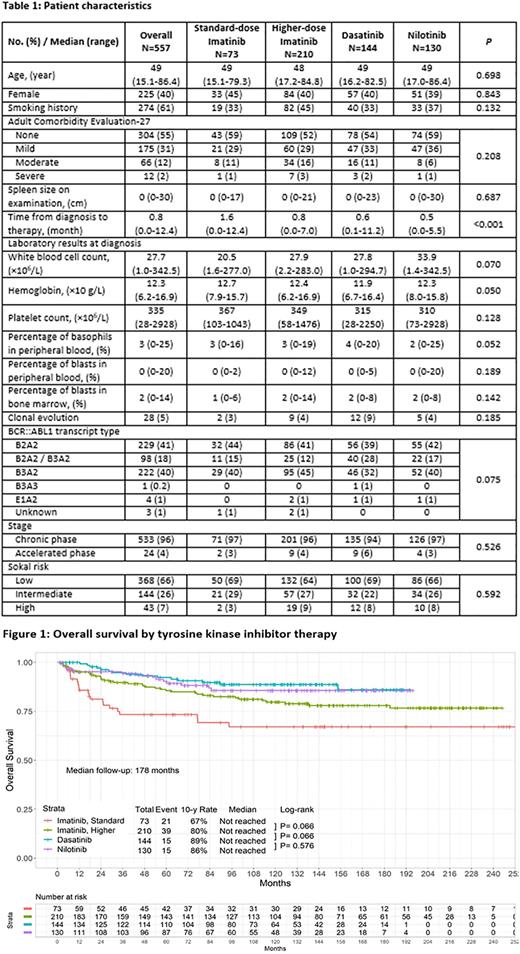Abstract
Background: Tyrosine kinase inhibitor (TKI) therapy improved survival in patients (pts) with chronic myeloid leukemia (CML). Treatment-free remission (TFR) can be considered for a minority of pts, particularly in those who achieved sustained deep molecular response (DMR). Given most pts needs TKI therapy over decades, the aim of this study is to evaluate the very long-term outcome of pts (pts) treated with frontline TKI.
Methods: We analyzed 557 pts with newly diagnosed CML in chronic phase (CP) and accelerated phase (AP; based solely on the presence of clonal evolution) who were treated with frontline TKI therapy (standard-dose imatinib, 73 pts; higher-dose imatinib, 210 pts; dasatinib, 144 pts; and nilotinib, 130 pts) from July 2000 to September 2014. The presence of comorbidity was assessed by the Adult Comorbidity Evaluation-27. Responses criteria were previously defined (complete cytogenetic response, CCyR; major molecular response, MMR; molecular response with a 4-log reduction, MR4; molecular response with a 4.5-log reduction, MR4.5). Failure-free survival (FFS) was calculated from the start of therapy to the treatment discontinuation for any reason except of TFR; event-free survival (EFS), to the date of any of the events while on study as defined in the IRIS study; transformation-free survival (TFS), to the date of transformation to accelerated or blast phases during study; overall survival (OS), to the date of death from any cause at any time or date of last follow-up. We evaluated prognostic factors with univariate and multivariate Cox proportional hazard models with a p-value cutoff of 0.100 or less by univariate analysis for variable selections; cumulative incidence of response was assessed with a competing risk model. Multiple imputation was performed for missing variables to reduce bias. Time to complete cytogenetic response was analyzed as a time-dependent variable in the Cox regression
Results: The median age at the start of TKI therapy was 49 years (range, 15.1-86.4). The overall median follow-up was 178 months (range, 5.3-253.9) (standard-dose imatinib, 231 months; higher-dose imatinib, 212 months; dasatinib 137 months; nilotinib 138 months) (Table 1). Overall, the 10-year cumulative incidence rates of CCyR, MMR, MR4, and MR4.5 were 91%, 87%, 76%, and 72%, respectively; among pts who responded, the median time to CCyR, MMR, MR4, and MR4.5 were 3.1 months, 5.9 months, 9.5 months, and 12.5 months, respectively. The cumulative incidence rates of CCyR, MMR, MR4, and MR4.5 were higher in the higher-dose imatinib, dasatinib, and nilotinib cohorts compared to standard-dose imatinib. The 10-year FFS rates were 48%, 52%, 67%, and 44% in the standard-dose imatinib, higher-dose imatinib, dasatinib, and nilotinib cohorts, respectively (P<0.001); the 10-year TFS rates were 84%, 98%, 98%, and 96%, respectively (P<0.001); the 10-year EFS rates were 67%, 80%, 89%, 86%, respectively (P=0.001); the 10-year OS rates were 67%, 80%, 89%, and 86%, respectively (P=0.206) (Figure 1). Backward multivariate Cox regression analysis identified older age at TKI therapy, the presence of smoking history, higher severity of comorbidity by the Adult Comorbidity Evaluation-27, higher percentage of blasts in peripheral blood, and longer time to achieve CCyR as adverse prognostic factors for survival. With the minimum median follow-up of more than 10 years in all the TKI groups, the 10-year relative survival rate was 91.4%; among pts who achieved CCyR within 1 year of frontline TKI therapy, the 10-year relative survival rate was 94.4%; MMR, 97.0%; MR4, 96.7%; MR4.5, 96.2%.
Conclusion: TKI therapy has significantly improved outcomes of pts with CML-CP. Frontline second-generation TKIs achieve higher rates of DMR response than standard-dose imatinib. The assessment of comorbidity is essential assessment for the optimal selection of frontline TKI therapy. The survival of pts with CML-CP is similar to that of general population at 10 years.
Disclosures
Sasaki:Otsuka Pharmaceuticals: Honoraria; Daiichi-Sankyo: Membership on an entity's Board of Directors or advisory committees; Pfizer: Membership on an entity's Board of Directors or advisory committees; Novartis: Consultancy, Membership on an entity's Board of Directors or advisory committees, Research Funding. Issa:Celgene, Kura Oncology, Syndax, Merck, Cullinan and Novartis: Research Funding; Novartis, Kura Oncology, Nuprobe: Consultancy. Alvarado:Daiichi-Sankyo/Lilly: Research Funding; BerGenBio: Research Funding; Jazz Pharmaceuticals: Research Funding; Sun Pharma: Research Funding; FibroGen: Research Funding; Astex Pharmaceuticals: Research Funding. Ferrajoli:AstraZeneca: Membership on an entity's Board of Directors or advisory committees, Research Funding; Janssen: Membership on an entity's Board of Directors or advisory committees; Beigene: Research Funding. Kadia:Regeneron: Research Funding; Amgen: Research Funding; cyclacel: Research Funding; AstraZeneca: Research Funding; Delta-Fly: Research Funding; Astex: Honoraria; Ascentage: Research Funding; Genfleet: Research Funding; Astellas: Research Funding; JAZZ: Consultancy, Research Funding; Novartis: Consultancy; cellenkos: Research Funding; Pfizer: Research Funding; PinotBio: Consultancy; Iterion: Research Funding; Glycomimetics: Research Funding; Genentech: Consultancy, Research Funding; Servier: Consultancy; BMS: Consultancy, Research Funding; Agios: Consultancy; Abbvie: Consultancy, Research Funding. Yilmaz:Daiichi-Sankyo: Research Funding; Pfizer: Research Funding. Pemmaraju:stemline: Consultancy; abbvie: Consultancy; immunogen: Consultancy; mustangbio: Research Funding; incyte: Consultancy; novartis: Research Funding; pacylex: Consultancy, Research Funding; samus: Research Funding; daiichi sankyo: Research Funding; cellectis: Research Funding; cellularity: Research Funding. Garcia-Manero:Curis: Honoraria, Research Funding; AbbVie: Honoraria, Research Funding; Astex: Consultancy, Honoraria, Research Funding; BMS: Consultancy, Honoraria, Research Funding; Gilead Sciences: Research Funding; Novartis: Honoraria, Research Funding; Genentech: Honoraria, Research Funding; Aprea: Honoraria; Acceleron Pharma: Consultancy. Jabbour:Genentech: Other: Advisory Role, Research Funding; Pfizer: Other: Advisory Role, Research Funding; Spectrum: Research Funding; Bristol Myers Squibb: Other: Advisory Role, Research Funding; Amgen: Other: Advisory Role, Research Funding; Adaptive Biotechnologies: Other: Advisory Role, Research Funding; AbbVie: Other: Advisory Role, Research Funding; Takeda: Other: Advisory Role, Research Funding. Kantarjian:Novartis: Honoraria, Research Funding; Jazz Pharmaceuticals: Research Funding; KAHR Medical Ltd: Honoraria, Membership on an entity's Board of Directors or advisory committees; AbbVie: Honoraria, Research Funding; Astellas Health: Honoraria, Membership on an entity's Board of Directors or advisory committees; NOVA Research: Honoraria; Ipsen Pharmaceuticals: Honoraria, Membership on an entity's Board of Directors or advisory committees; ImmunoGen: Research Funding; Amgen: Honoraria, Research Funding; Ascentage: Membership on an entity's Board of Directors or advisory committees, Research Funding; Daiichi-Sankyo: Consultancy, Research Funding; Pfizer: Honoraria, Research Funding; Takeda: Honoraria.
Author notes
Asterisk with author names denotes non-ASH members.


This feature is available to Subscribers Only
Sign In or Create an Account Close Modal